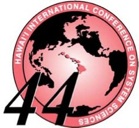
Electronic Government, or Digital Government, is a multidisciplinary research domain, which studies the use of information and technology in the context of public policy making (electronic governance, open government, and digital divide/s), government operations (transformation, management, organization, infrastructure, interoperability, security), citizen engagement (e-participation, transparency, collaboration, and digital democracy), and government services (including using social media).
Numerous disciplines contribute to this intersection of research such as computer science, information systems research, information science, political science, organizational sciences (public administration and business administration), sociology, and psychology among others.
The HICSS e-Government track has been a hotbed for groundbreaking studies and new ideas in this particular research domain. Many studies first presented here were developed further and then turned into publications at top journals. Nine minitracks cover the full spectrum of research avenues of electronic government including minitracks dedicated to emerging topics, open government, and social networking.
The e-Government Track at HICSS is in the top two tracks with the lowest acceptance rate and the highest average per-session participation. HICSS is in the top 2 percent of all IEEE conferences with regards to proceedings hits and paper downloads.
“Over the years, the Electronic Government Track at HICSS has developed into a premier platform for researchers from around the world to present and discuss their best work with colleagues.”
Hans Jochen Scholl, Track Chair
A Study Domain With Growing Reputation


Contact Information
Hans J (Jochen) Scholl
University of Washington
The Information School
Mary Gates Hall, Suite 310c
Box 352840
Seattle, WA 98195-2840, USA
Phone: +1-206-616-2543
Fax: +1-206-616-3152
Email: jscholl@u.washington.edu
Go to HICSS Conference Site
Important Deadlines
June 15: Authors submit full papers by this date, following the Author Instructions.
All papers will be submitted in double column publication format and limited to 10 pages including diagrams and references. HICSS papers undergo a double-blind review (June15 - August15).
Time until HICSS-44 opens:

August 15: Acceptance notices are sent to Authors. At this time, at least one author of an accepted paper should begin visa, fiscal & travel arrangements to attend the conference to present the paper.
September 15: Authors submit Final Version of papers following submission instructions posted on the HICSS web site. At least one author of each paper must register by this date with specific plans to attend the conference.
October 2: Papers without at least one registered author will be pulled from the publication process; authors will be notified.

More information on the track chair:
Jochen Scholl, PhD, serves as an Associate Professor in the Information School at the University of Washington, Seattle, WA. He earned a Ph.D. in Information Science from the University of Albany, NY/SUNY and also holds a Master's degree in Business Administration from the GSBA Zurich, Switzerland. His research interests focus on modeling human-originated complex systems, in particular, by means of system dynamics. Besides quantitative approaches he also embarks on qualitative research using Action Research, Cognitive Action/Activity Analysis among other methods. Areas of study include technology evolution, information management, pro sports information management, mobile computing, electronic government, organizational change, process change, business intelligence, and information systems success. Jochen serves as president of the Digital Government Society of North America and as Vice Chair of the IFIP WG 8.5 (IS and Public Administration). Jochen's group also maintains and publishes the E-Government EndNote Reference Library.






